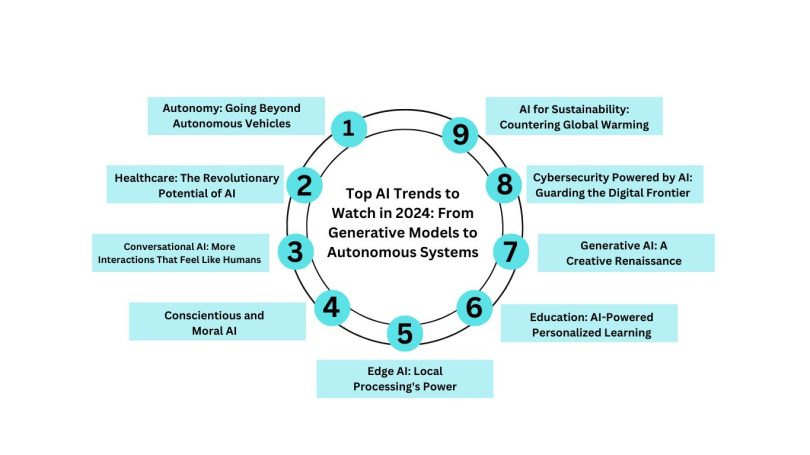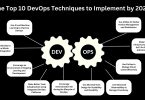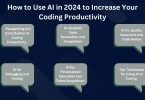By 2024, artificial intelligence (AI) will have changed our world in ways that were previously only seen in science fiction. Not only is AI developing, but it’s also changing entire industries, our everyday lives, and the course of history. The top AI trends that are expected to take off in 2024 are shown here, providing a preview of a world in which artificial intelligence will have a greater and more widespread impact than it has in the past.
1. Autonomy: Going Beyond Autonomous Vehicles
Although driverless vehicles have been the face of autonomy, more widespread use of autonomous technologies is expected by 2024. Imagine package delivery drones flying over cities, warehouse robots operating with efficiency, and automated systems handling intricate jobs in retail settings. These developments will make robots become capable partners, increasing production and efficiency. They are driven by sophisticated algorithms, state-of-the-art sensors, and enormous data banks.
Key Competencies for 2024:
Robotics Engineering: Robotics engineering is the study of creating, coding, and managing unmanned aerial vehicles.
Sensor Technology and Integration: Sensor Technology and Integration: Creating and incorporating sensors that are necessary for job execution and navigation.
Machine Learning and Data Analytics: These fields deal with the creation of algorithms that enable machines to learn and make decisions on their own.
2. Healthcare: The Revolutionary Potential of AI
AI has the potential to completely transform the healthcare industry by providing bioinformatics to uncover novel medical insights, AI-driven diagnostic tools with exceptional accuracy, and predictive analytics for individualized patient care. The epidemic of COVID-19 has highlighted the critical necessity for timely, accurate medical interventions. These inventions aim to improve patient outcomes and enhance healthcare systems.
Key Competencies for 2024:
Bioinformatics: Using machine learning and biology to advance medical research and innovation.
AI Diagnostic Tools: Creating and improving AI tools for precise medical diagnosis is known as AI diagnostics.
Predictive analytics: Predictive analytics is the process of utilizing data analysis to anticipate medical trends and patient needs.
3. Conversational AI: More Interactions That Feel Like Humans
We go from basic, robotic interactions to complex, human-like conversations as conversational AI advances. These AI systems will provide smooth and intuitive interactions by anticipating human demands, comprehending context, and even detecting emotions. This will improve user experiences in a number of areas, such as digital teaching and customer service.
Key Competencies for 2024:
Natural Language Processing (NLP): NLP is the field of study that aims to develop AI that can understand and produce human language.
Emotion AI: The goal of emotion AI is to create machines that can recognize and comprehend human emotions.
UX/UI Design for AI: Designing user-friendly interfaces for smooth communication between humans and AI is known as UX/UI Design for AI.
4. Conscientious and Moral AI
As AI becomes more and more ingrained in our daily lives, the need of ethics, accountability, and transparency cannot be overstated. The requirement for impartial, open, and bias-free systems is emphasized by the need for responsible AI. The establishment of regulations by regulatory agencies will be essential to guaranteeing that AI technologies advance society without endangering it.
Key Competencies for 2024:
AI Ethics: striking a balance between morality and AI capabilities.
Regulatory Compliance: Handling new laws and guidelines pertaining to AI.
Bias Detection: Finding and eliminating biases in AI models is known as bias detection.
5. Edge AI: Local Processing’s Power
Edge artificial intelligence improves speed, accuracy, and privacy by moving data processing closer to the source. For applications like industrial robots and driverless cars that need real-time data analysis, this trend is essential. Edge AI guarantees dependability even in offline settings, improves privacy, and lowers latency by processing data locally.
Key Competencies for 2024:
Edge Computing: Creating AI solutions that are effective at the device level is known as “edge computing.”
Real-time Data Processing: This is the management of data analysis in real-time at the source.
Embedded Systems: Creating AI systems for local device usage is known as embedded systems design.
6. Education: AI-Powered Personalized Learning
AI’s ability to provide individualized learning experiences will revolutionize education. Content will be customized for each student using adaptive learning systems, taking into account their specific needs and learning preferences. Education will become more inclusive and efficient with this individualized approach, guaranteeing that each student gets the support they require to achieve.
Key Competencies for 2024:
Adaptive Learning Design: Developing AI-driven curriculum that change to suit each learner is known as adaptive learning design.
Education Data Analysis: using data to enhance AI-powered learning resources.
Pedagogical AI: Using AI to improve learning results by combining it with conventional teaching techniques.
7. Generative AI: A Creative Renaissance
With amazing skill, generative AI is creating literature, art, and music, setting new standards. These technologies will help artists, designers, and content creators in 2024 by becoming even more potent and adaptable. There are many possible uses, from producing intricate design prototypes to producing one-of-a-kind artwork.
Key Competencies for 2024:
Creative AI Development: Developing novel uses for generative AI in creative domains is known as “creative AI development.”
Knowledge Graphs: Ensuring correctness by fact-checking generative AI outputs.
Content Quality Control: Ensuring high standards for content generated by AI is known as content quality control.
8. Cybersecurity Powered by AI: Guarding the Digital Frontier
The need for AI-powered cybersecurity is growing as sophisticated cyber threats increase Artificial intelligence (AI) systems can spot patterns in large datasets to spot abnormalities and take preventative action. This allows them to detect and protect against threats. To avoid manipulation or abuse, it is also essential to guarantee the security and integrity of AI systems.
Key Competencies for 2024:
Cybersecurity Analytics: AI models are being developed for cybersecurity analytics in order to identify and stop cyber threats.
AI System Security: Preventing manipulation and abuse of AI systems.
Incident Response: Using AI-driven solutions to address cybersecurity breaches
9. AI for Sustainability: Countering Global Warming
AI will be crucial in advancing environmental protection and halting global warming. AI can enhance the use of renewable energy sources, boost sustainable agriculture practices, and improve energy efficiency by analyzing massive databases. In an effort to lessen the carbon footprint of AI systems, efforts are also being made to create AI algorithms that are more energy-efficient.
Key Competencies for 2024:
Sustainability Analytics: Sustainability analytics is the application of AI to environmental protection.
AI development that is energy-efficient: developing algorithms with lower energy use.
AI applications in agriculture: Using AI to improve environmentally friendly farming methods.
It’s critical to think about how AI will change our careers and the skills required for a world where AI dominates as we get ready for these developments. Although AI has a lot of promise, there are a lot of challenges with it as well. Achieving a balance between ethical issues and innovation will be necessary to fully utilize AI’s potential for societal advancement. Let’s embrace the great opportunities AI presents as we move into 2024 and continue to be mindful of its responsible and equitable application.








